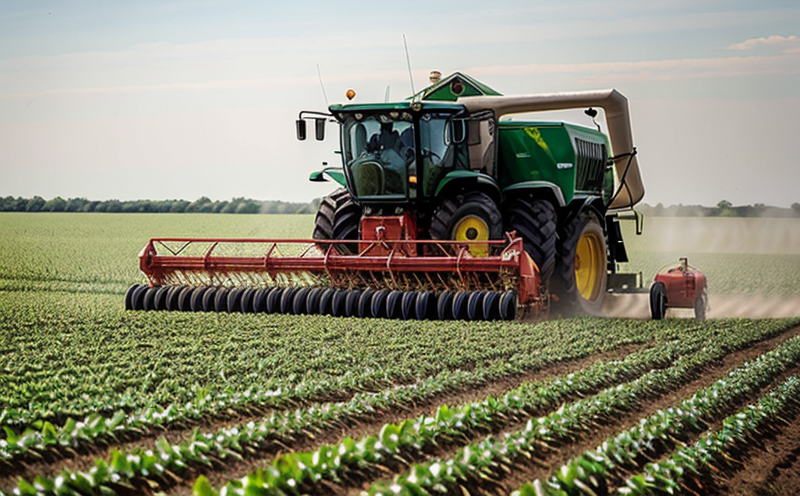Nutrient Use Efficiency Testing
The evaluation of nutrient use efficiency (NUE) in agriculture and forestry is pivotal for optimizing crop yield and productivity. This testing method helps determine the ratio between the amount of nutrients applied to a crop or forest and the resulting crop or biomass production. Accurate NUE testing ensures that farmers, foresters, and agricultural industries can efficiently manage resources, thereby minimizing waste and environmental impact.
The process involves several stages, including soil sampling, nutrient application, controlled growing conditions, and yield measurement. The aim is to identify how effectively crops or trees utilize nutrients for growth and development. This testing not only supports sustainable farming practices but also contributes significantly to reducing the overall carbon footprint by minimizing unnecessary inputs of fertilizers.
Understanding NUE is crucial in various sectors such as agriculture, forestry, horticulture, and even urban green spaces. By optimizing nutrient uptake, these industries can reduce costs, enhance productivity, and promote environmental sustainability. For instance, in agriculture, crops that exhibit higher NUE are less dependent on synthetic fertilizers, leading to reduced runoff into water bodies which can cause eutrophication.
Adhering to international standards such as ISO 16734-2 for soil quality assessment and ISO 15089-2 for crop production, this testing ensures reliability and consistency in results. Compliance with these standards is essential not only for regulatory purposes but also to ensure that the data obtained can be used across different regions and contexts.
Our laboratory uses advanced instrumentation like spectrophotometers and mass balances to measure nutrient content accurately. This technology allows us to provide precise results, which are critical for making informed decisions about resource management. By leveraging these tools, we help our clients achieve optimal crop or forest health while adhering to best practices in sustainability.
Optimizing NUE is not just beneficial for individual farms or forests; it has broader implications for global food security and environmental conservation. As the world faces challenges related to climate change and resource scarcity, efficient use of agricultural inputs becomes more important than ever before. Through thorough testing, we contribute towards creating a more resilient and sustainable future.
Applied Standards
In conducting nutrient use efficiency tests, our laboratory strictly adheres to international standards that ensure accuracy and consistency across all measurements. Here are some of the key standards we follow:
- ISO 16734-2: Soil Quality - Determination of Available Nitrogen in Soils - This standard provides methods for determining the available nitrogen content in soil, which is crucial for understanding how efficiently crops can absorb this nutrient.
- ASTM D5809: Standard Practice for Use of Near-Infrared Spectroscopy to Determine Moisture and Other Constituents in Plant Material - This practice outlines procedures for using near-infrared spectroscopy to analyze plant materials, including moisture content and other relevant constituents.
- EN ISO 15089-2: Crop Production - Determination of Nitrogen Content in Fertilizers - This standard specifies the methods for determining nitrogen content in fertilizers, ensuring that the applied nutrients are correctly dosed according to crop requirements.
By following these rigorous standards, we ensure that our clients receive reliable and accurate results, which can be used confidently in decision-making processes related to resource management and environmental impact assessment.
Environmental and Sustainability Contributions
The testing of nutrient use efficiency (NUE) plays a crucial role in promoting sustainable agricultural practices. By optimizing the application of nutrients, we help reduce the ecological footprint associated with excessive fertilizer usage. Here are some specific ways our services contribute to environmental sustainability:
- Reduction in Water Pollution: Lowering the amount of unused fertilizers that enter water systems helps prevent eutrophication and maintains aquatic ecosystems.
- Soil Health Preservation: Efficient nutrient uptake promotes healthier soil structures, enhancing long-term productivity without degrading natural resources.
- Energy Conservation: Less dependency on synthetic fertilizers means reduced energy consumption in their production processes.
- Biodiversity Enhancement: Sustainable farming practices supported by NUE testing can lead to improved biodiversity within cultivated lands and surrounding areas.
Our commitment to environmental responsibility extends beyond just these benefits. By offering precise and reliable nutrient use efficiency tests, we empower our clients to make informed decisions that have positive impacts on both their operations and the environment at large.
Competitive Advantage and Market Impact
The ability to accurately measure nutrient use efficiency offers significant advantages in today’s highly competitive agricultural market. Here are some key points highlighting why this service is essential:
- Cost Efficiency: By optimizing the application of nutrients, farmers can reduce costs associated with unnecessary fertilizer purchases.
- Increased Productivity: Efficient nutrient utilization leads to higher crop yields and better quality produce, giving businesses a competitive edge in terms of market share.
- Regulatory Compliance: Adherence to international standards ensures that our clients remain compliant with local regulations regarding agricultural practices.
- Sustainable Brand Image: Implementing sustainable farming techniques enhances the reputation and brand value of companies committed to environmental stewardship.
The demand for eco-friendly products continues to grow, driven by consumer awareness about sustainability issues. Offering nutrient use efficiency testing demonstrates a company's dedication to these values and positions them favorably in the marketplace. Our clients benefit from being able to market their products as sustainably produced, potentially opening up new markets and customer bases.





